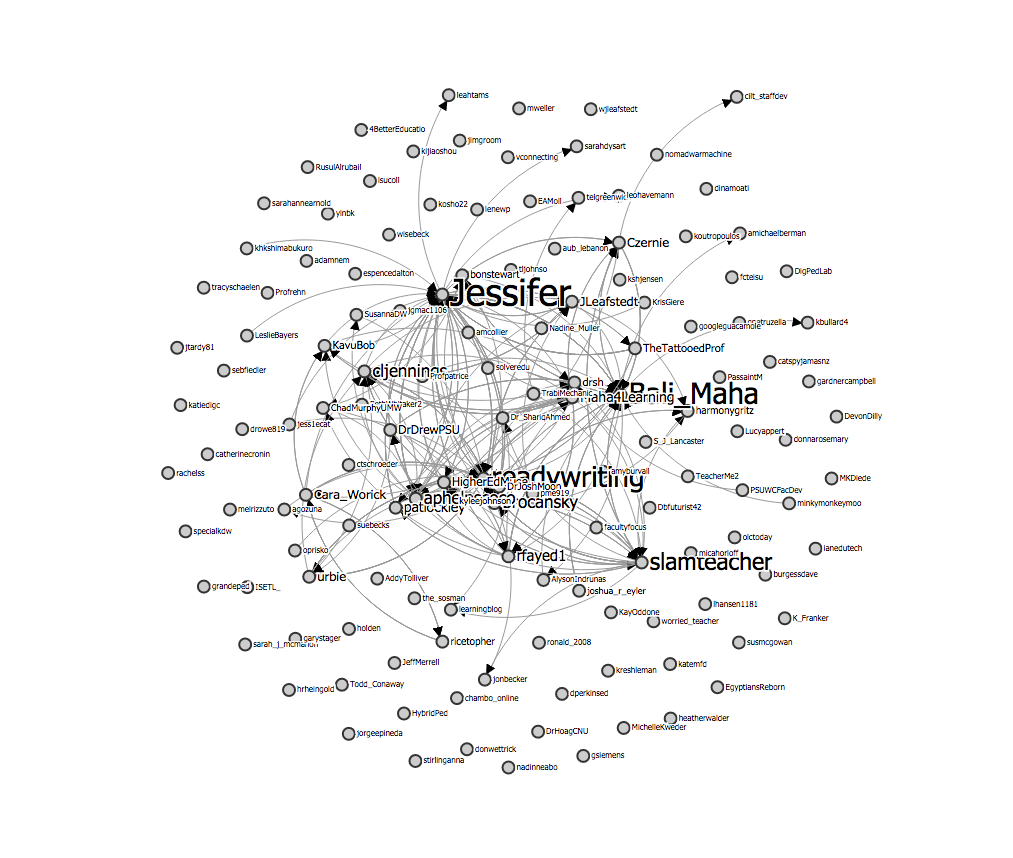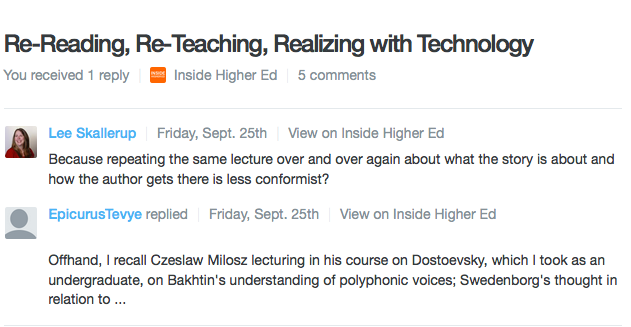You have /5 articles left.
Sign up for a free account or log in.
I’m not happy with this post, but I’ve been struggling to untangle these ideas, and to twist or weave them back together in any sort of meaningful way. Sometimes I strive for beauty, other times elegance, and always coherence. This, this one, I think is none of those things. As a pulled at the disparate threads, they frayed and knotted and tangled up again. I used to remember rubbing between my thumb and forefinger the knots that had formed in my grandmother’s fine necklaces, willing them to loosen and allow me to untie them. Consider this a moment when the knot is still tight, and I’m still working.
Monday afternoon (eastern time at least), I co-hosted the first #facdevchat on Twitter. You can see the raw archive here. But if you would like to see what it looks like:

You can see your own version of the visualization here, and it is a visualization that is always evolving because the archive is collecting new tweets that use the hashtag every hour. It keeps moving, shifting evolving. And every time you refresh the page, you’ll get a new way to see the same information.
The topic of the divide between staff and faculty, between teaching and research, service and everything else kept coming up (in part because I kept injecting it into the conversation, but I was far from the only one). Divide, divide, divide. Slice, slice, slice. Isolate, isolate, isolate. And the only power we seem to have is to create hierarchies that further divide, slice, and isolate.
Today, two pieces of teaching, specifically about the tiers that exist therein came across my feed: Full-Time, Off Tenure-Track and Stop Resisting a 2-Tier System. They would seem to compliment one another nicely: on the one hand, full-time “teaching”/non-tt faculty seem to be just as satisfied as those who are on the tenure track or who are tenured. Yay! The 2-tier system is already here and so we need to start acknowledging that in how we “train” PhD students. Teaching PhDs for the many, research PhDs for the few.
Except:
…non-tenure-track faculty reported significantly less satisfaction with the sense of collegiality in their departments, confirming, the authors say, a longstanding charge that nontenured faculty often feel like “second-class citizens.
Hmmmm….
But how is that possible? One theory:
Thus we have created an entire class of professionals who are essentially overqualified for most of the available positions. They have their Ph.D., their scholar’s guild membership card, but they’re not being paid to use it. I mean that in both ways: The work they are being paid to perform often has little to do with their Ph.D., and the pay itself is not commensurate with their qualifications. It’s as if we’re hiring doctors to perform the work of nurse practitioners. Nor, it should be noted, are those people actually admitted to the guild. Teaching four or five sections of composition or world history each semester, with little or no time for research, they are not scholars, except in the broadest sense of the term, and they are not truly recognized as scholars within the academic community.
Because teaching isn’t scholarship, right? And reinforcing that hierarchy and misnomer is the way to…help bridge the gap?
And yet, the “real” scholars are still expected to teach. And the “fake” ones who “only” teach, are they not supposed to stay up-to-date in their field?
I’m treading on well-worn ground, and I’ll let you all in the comments duke it out in terms of the “value” of teaching as scholarship generally and my personal qualifications to be able to offer any sort of suggestions or criticism.
What I want to think about instead is how to bridge this wholly artificial gap between teaching and research.
Woe be it for me to give some sort of credence to comments that clearly wishes to derail (or at least redirect) the discussion, but, a now-deleted comment on my last post points to the problem of good pedagogy, or at least the distraction that technology can provide.

Derek Bruff already addressed the difference between different kinds of “lecturing”, such as the type referenced above. Here’s the thing about the now-deleted description: the professor was modeling the kind of discipline-specific knowledge-building activities in his “lectures.” The kind that comes from a deep engagement with the materials in question, and an understanding of a way (and maybe a few ways) to communicate that knowledge and skill.
The kind that comes when pedagogy and research come together.
That, to me, is what a “scholar” is. If you’re not teaching, then you’re just researching, and that makes you…a researcher. I used “just” very strategically here.
I don’t regret my PhD, even if I have only taught three upper-division courses during my entire career in higher education thus far, none in my specialty. Not one. I think that the research and thinking that you get to do during a PhD are an important component of being an effective scholar.
But I think pedagogy is, too. Not as an ad-on. Not as an extra certification. As an integral component.
Think of a rope. A rope has strands, each one individual, but twisted together to create something stronger, more durable, and more (dare I say it) useful. Or, if thread is a finer metaphor, then fine pieces of thread are actually, like a rope, twisted together. No strand is more important than the other.
We braid, we twist, we weave these strands together to create something better. To me, that’s being a scholar. Pedagogy is something that is integrated in the deep study of the subject matter, and the deep study of the subject matter is integrated in the pedagogy.
Are there excellent teachers who “only” have Master’s degrees? Sure. But I’ve always wonder, how many are ABD, or have some PhD level coursework. I don’t think having a PhD in any way, shape, or form has made me “over-qualified” to teach an introductory level course like the introduction to literature course I’m teaching now. I think that the “underpaid” argument is one that distracts from the undervaluing the institution has of teaching. And if we’re going to propose structural changes, why focus on bringing ourselves down to the level where we are apparently valued and work on raising the value we place on pedagogy.
How does that work? I have no idea. But to continue divide, to isolate, to create hierarchies that pit the various stakeholders in the institution against one another is not the path forward. Our students suffer, and ultimately are institutions will too.

